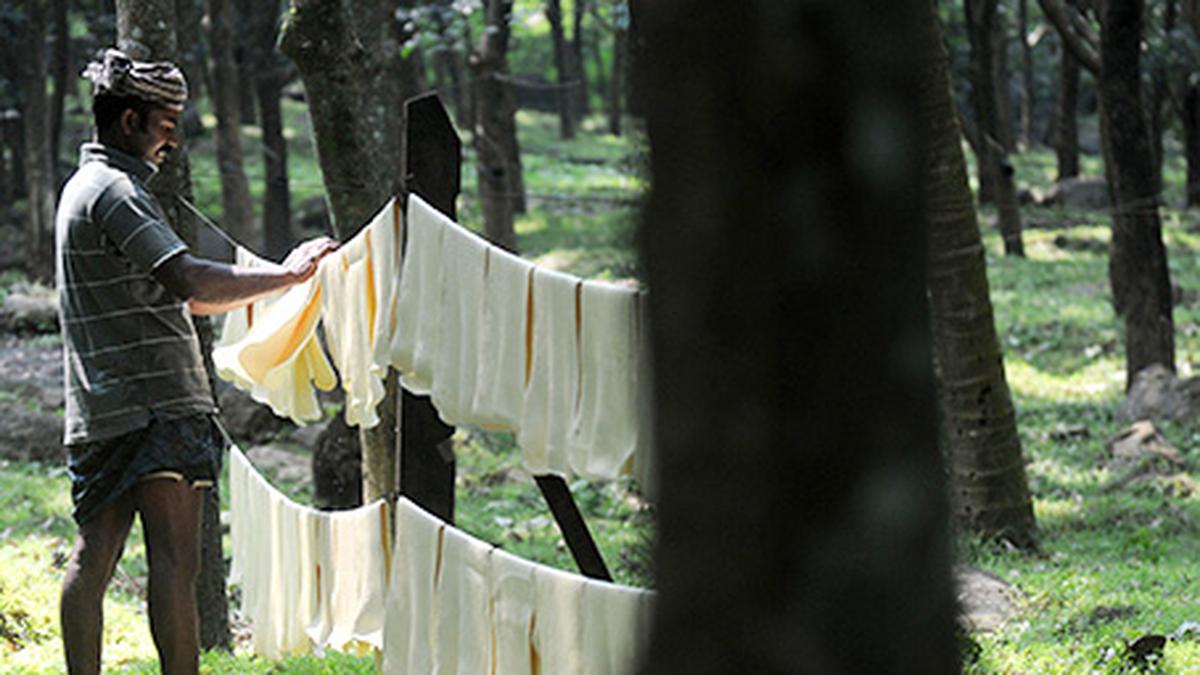
CAMPCO seeks minimum support price for rubber growers in Karnataka as farmers are in dire straits
The Hindu
CAMPCO appeals to CM Siddaramaiah to extend minimum support price to rubber growers in Karnataka, as price of natural rubber has dropped by 42%. 60,000 growers cultivate rubber on 55,000 hectares in Karnataka. =
The Central Arecanut and Cocoa Marketing and Processing Cooperative (CAMPCO) Ltd., Mangaluru, which also markets rubber, has appealed to Chief Minister Siddaramaiah to extend minimum support price to rubber growers in Karnataka on the lines of Kerala as the price of natural rubber slumped by over 42% in the past more than a decade.
In a letter to the Chief Minister on September 18, 2023 its president A. Kishore Kumar Kodgi said that the price of natural rubber drastically declined from ₹242 a k.g. in 2011 to ₹140 a k.g. in 2023 (a drop by 42.15 % or ₹102 per a k.g.).
“Rubber growers in Karnataka are facing disastrous situation due to the steep fall in price,” Mr. Kodgi who heads the multi-state cooperative society of Karnataka and Kerala said.
Mr. Kodgi said that nearly 60,000 growers cultivated rubber on about 55,000 hectares in Karnataka. Rubber is prominently grown in Dakshina Kannada, Udupi, Uttar Kannada, Kodagu, Shivamogga, Chikmagaluru, Hassan and Mysuru districts. The State produced around 40,000 tons of natural rubber per annum, and its consumption stood at around 60,000 tons.
Seeking the minimum support price under the market intervention scheme, he said under the ‘Rubber Production Incentive Scheme’ of Kerala government, ₹170 a k.g. is ensured as the minimum price for RSS IV (Ribbed Smoked Sheets) and RSS V grade rubber. The difference between the market support price and the Daily Reference Price approved by the Rubber Board will be credited to the bank account of the farmer directly on the basis of purchase bills furnished by the Rubber Producers’ Societies and duly certified by the Field Officers of the Rubber Board. This scheme is, interalia, expected to improve the market price of rubber, Mr. Kodgi said.
The CAMPCO also markets pepper after procuring the produce from farmers. (EOM)

“Writing, in general, is a very solitary process,” says Yauvanika Chopra, Associate Director at The New India Foundation (NIF), which, earlier this year, announced the 12th edition of its NIF Book Fellowships for research and scholarship about Indian history after Independence. While authors, in general, are built for it, it can still get very lonely, says Chopra, pointing out that the fellowship’s community support is as valuable as the monetary benefits it offers. “There is a solid community of NIF fellows, trustees, language experts, jury members, all of whom are incredibly competent,” she says. “They really help make authors feel supported from manuscript to publication, so you never feel like you’re struggling through isolation.”

Several principals of government and private schools in Delhi on Tuesday said the Directorate of Education (DoE) circular from a day earlier, directing schools to conduct classes in ‘hybrid’ mode, had caused confusion regarding day-to-day operations as they did not know how many students would return to school from Wednesday and how would teachers instruct in two modes — online and in person — at once. The DoE circular on Monday had also stated that the option to “exercise online mode of education, wherever available, shall vest with the students and their guardians”. Several schoolteachers also expressed confusion regarding the DoE order. A government schoolteacher said he was unsure of how to cope with the resumption of physical classes, given that the order directing government offices to ensure that 50% of the employees work from home is still in place. On Monday, the Commission for Air Quality Management in the National Capital Region and Adjoining Areas (CAQM) had, on the orders of the Supreme Court, directed schools in Delhi-NCR to shift classes to the hybrid mode, following which the DoE had issued the circular. The court had urged the Centre’s pollution watchdog to consider restarting physical classes due to many students missing out on the mid-day meals and lacking the necessary means to attend classes online. The CAQM had, on November 20, asked schools in Delhi-NCR to shift to the online mode of teaching.









